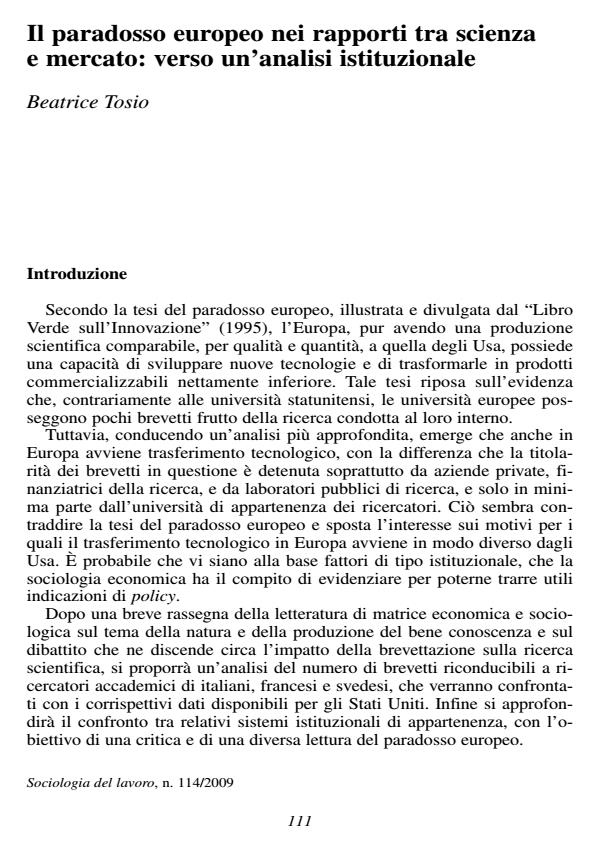Il paradosso europeo nei rapporti tra scienza e mercato: verso un’analisi istituzionale
Titolo Rivista SOCIOLOGIA DEL LAVORO
Autori/Curatori Beatrice Tosio
Anno di pubblicazione 2009 Fascicolo 2009/114 Lingua Italiano
Numero pagine 14 P. 111-124 Dimensione file 230 KB
DOI 10.3280/SL2009-114009
Il DOI è il codice a barre della proprietà intellettuale: per saperne di più
clicca qui
Qui sotto puoi vedere in anteprima la prima pagina di questo articolo.
Se questo articolo ti interessa, lo puoi acquistare (e scaricare in formato pdf) seguendo le facili indicazioni per acquistare il download credit. Acquista Download Credits per scaricare questo Articolo in formato PDF

FrancoAngeli è membro della Publishers International Linking Association, Inc (PILA)associazione indipendente e non profit per facilitare (attraverso i servizi tecnologici implementati da CrossRef.org) l’accesso degli studiosi ai contenuti digitali nelle pubblicazioni professionali e scientifiche
The European Paradox between science and market: towards an institutional analysis - According to the "European Paradox" conjecture, although Eu countries have a top-level scientific output, they can’t convert this strength into practical applications. Indeed, comparing the number of patents stemming from academic researches in Italy, France, Sweden and the Us, the author criticises the validity of the paradox. In fact, according to data, technology transfer seems to occur also in Europe, but the ownership of academic patents is seldom held by universities. After a brief review of the economical and sociological literature about nature and production of knowledge, the author analyses the role of institutions in explaining such differences, outlining two different models of technology transfer: the European and the American one. The first model seems to derive from centralisation and bureaucratisation of the university system, where academics are civil servants, while the second one seems to derive from decentralisation and autonomy of the single universities, where academics are employees engaged not only in teaching and research but also in the solution of practical problems. The author points out that sociological investigation can explain the differences in technology transfer patterns through institutions with policy implications at both national and local level.
Key words: European Paradox, technology transfer, patents, university, institutions, knowledge;
Beatrice Tosio, Il paradosso europeo nei rapporti tra scienza e mercato: verso un’analisi istituzionale in "SOCIOLOGIA DEL LAVORO " 114/2009, pp 111-124, DOI: 10.3280/SL2009-114009